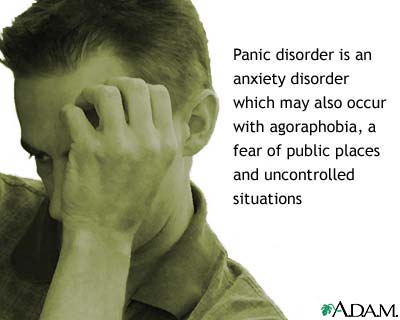Treatment
The goal of treatment is to help you feel and function better. The success of treatment usually depends in part on how severe the agoraphobia is.

The standard treatment approach combines cognitive-behavioral therapy (CBT) with an antidepressant medication.
* Selective serotonin reuptake inhibitors (SSRIs) are usually the first choice of antidepressant.
* Serotonin-norepinephrine reuptake inhibitors (SNRIs) are another choice. Other antidepressants and some anti-seizure drugs may be used for more severe cases.
* Other anti-anxiety medications may also be prescribed. For example, your health care provider may recommend benzodiazepines when antidepressants don’t help or before they take effect.
CBT involves 10 to 20 visits with a mental health professional over a number of weeks. CBT helps you change the thoughts that cause your condition. It may involve:
* Gaining understanding and control of distorted feelings or views of stressful events or situations
* Learning to recognize and replace panic-causing thoughts
* Learning stress management and relaxation techniques
* Systematic desensitization and exposure therapy, in which you are asked to relax, then imagine the things that cause the anxiety, working from the least fearful to the most fearful.
Gradually exposing the patient to the real-life situation that causes the fear has also helped some people overcome their fears.
A healthy lifestyle that includes exercise, enough rest, and good nutrition can also help be helpful.
Prognosis (Expectations)
Most patients can get better with medications or behavioral therapy. However, without early and effective help, the disorder may become more difficult to treat.
Complications
* Some people may abuse alcohol or other drugs while trying to self-medicate.
* Some people may be unable to function at work or in social situations.
* Some people may feel isolated, lonely, depressed, or suicidal.
Calling Your Health Care Provider
Call for an appointment with your health care provider if you have symptoms of panic attacks or agoraphobia.
Panic disorder with agoraphobia: Overview, Causes
Panic disorder with agoraphobia: Symptoms & Signs, Diagnosis & Tests
Panic disorder with agoraphobia: Treatment
Reviewed By : David B. Merrill, MD, Assistant Clinical Professor of Psychiatry, Department of Psychiatry, Columbia University Medical Center, New York, NY. Also reviewed by David Zieve, MD, MHA, Medical Director, A.D.A.M., Inc.
